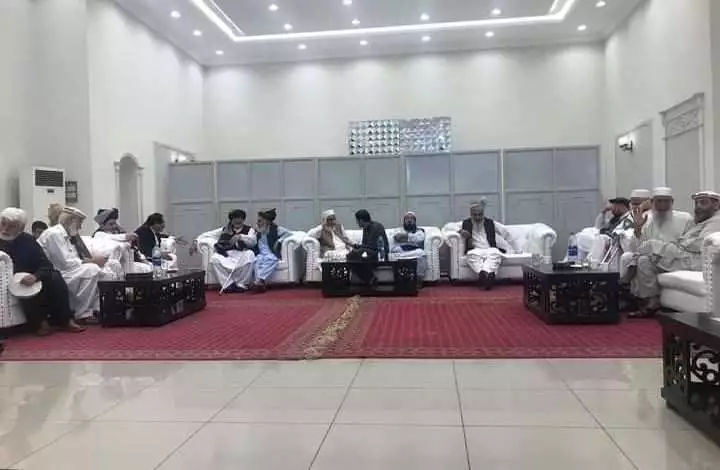The Pakistani army has sent 50 tribal leaders to join peace talks with the outlawed Tehreek-e-Taliban Pakistan (TTP). The dialogue is being mediated by Sirajuddin Haqqani, the Interior Minister of Taliban, under the framework of a grand assembly (Loya Jirga).
50 member jirga has left by air for Kabul for peace talks with Tehreek-e-Taliban Pakistan (TTP). The jirga includes key figures from all the tribal districts.#TTP #Kabul #PeaceJirga #Afghanistan #Pakistan pic.twitter.com/zL28QBaE3e
— Kainat Salim (@kainat_Salem) June 1, 2022
A fifty-member tribal jirga comprising leaders from the merged districts and religious scholars from the Khyber-Pakhtunkhwa province of Pakistan reached Kabul for a two-day visit on Wednesday. The delegation is meeting to deliberate on the TTP’s demand to roll back the Fata reforms – a major sticking point in the dialogue.
Pakistani Ambassador @ambmansoorkhan received more than 50 members tribal jirga in Kabul. The jirga will further discuss options for peace agreement with #TTP pic.twitter.com/Tg8o8MIIHX
— Fakhar KaKaKhel (@KAKAKHELMEDIA) June 1, 2022
Earlier these Jirga members were briefed by the former ISI chief and Corps Commander of Peshawar Lt. General Faiz Hameed who was part of two rounds of talks with the TTP leaders in Kabul. Hameed told them to press upon the TTP leaders to lay down arms, return home and live peaceful lives in Pakistan. But according to Pakistani watchers, TTP leaders, high on confidence, have their own demands.
“The TTP wants military withdrawal within 8 months; committees to be formed to discuss release of all the TTP prisoners; regarding Daesh or Islamic State, the TTP will ensure they will not cooperate with groups carrying out terror attacks inside Pakistan end, “ a Jirga member was quoted as saying.
Islamabad is asking the TTP leaders to terminate their insurgency against Pakistan and self-dissolve.
“Pakistani army has no issue with some of the TTP’s demands, but two major issues remained challenging: the reversal of Fata merger and the disbandment of the TTP as an armed militant group,” said the report.
According to a Jirga member, some of the militant leaders of the TTP had initially refused to participate in the peace talks with Pakistan, but Khalifa Sirajuddin Haqqani had made it clear to all the TTP factions that any individual or group not willing to join the negotiations would need to leave Afghanistan.
“I think there is no option for the militant factions to stay away from the peace talks with the Pakistan government. If talks with the TTP succeed then all of them will return to Pakistan and would start a peaceful life in their respective areas,” the jirga member told The News.
Talks between the Pakistani government and the TTP have a long and chequered history. Historically, these talks have never had a positive outcome.
Pakistani watchers believe that if negotiations are successful, there are some of the TTP factions who are refusing to accept the peace talks. They will never surrender their arms and weapons.
“Afghan Taliban and Pakistani army want to use the TTP to counter IS in their respective regions. By making a deal with the TTP, the Pakistani army wants to eliminate at least one of the threats,” says Imtiaz Gul, a Pakistani journalist.
The Afghan Taliban do not want to launch operations or impose sanctions against the Pakistani Taliban. They believe that alienating the Pakistani Taliban will drive them towards the IS, which can cause problems for the Afghan regime.
There are many in Pakistan who are wary of the ongoing talks.
“The army handpicked jirga has been sent to Kabul for creating the impression of “tribal ownership” for the accord between the Pakistani government and the TTP, but it is actually piloted by intel agencies to use the jirga as scapegoat for failure in implementation of the accord,” writes Afrasiab Khattak, a seasoned Pakistani politician who belong to the Pashtun tribe.
Also Read : Seeking a Pashtun homeland, Pakistan Taliban dominates new round of dialogue with desperate Islamabad




















